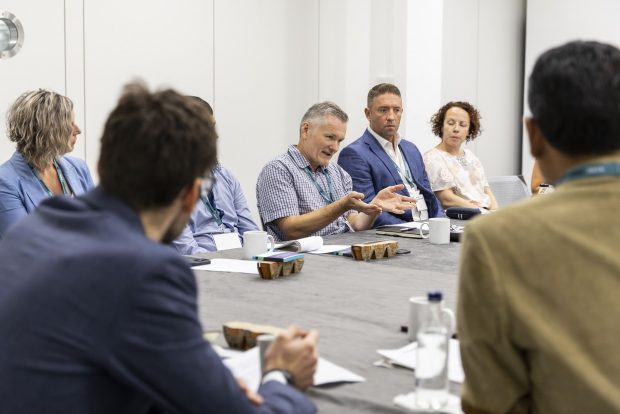Global Government Summit report; part 5

From wikilaws to citizens tracking their data online, the last session of the 2017 Global Government Summit brought together top officials from around the world to debate the challenges and opportunities around digital technologies. By Matt Ross
The day’s final session kicked off with a presentation by Mikhail Pryadilnikov, Deputy Director of the Analytic Center for the Russian Government. In recent years, he explained, Russia has set up 2,600 ‘multifunction service centres’ – each of them offering a range of services, from benefits to passport applications. Meanwhile, it has also been developing digital platforms that offer more convenient and rapid access to services. However, behind these new access points lie administrative and business processes that remain largely untouched by digital technologies: “The big problem is to get all the steps efficiently digitised,” he said. “The priority is to deal with life situations: if your baby is born, you need several solutions at the same time. So one of our goals is to strengthen the common solutions from different agencies.”
The government is now trying to integrate its digital services with the multifunction service centres, creating a single e-government service platform used by both federal and regional bodies. And Pryadilnikov looked ahead to a future in which, drawing on the ever-growing volume of data held on citizens, government services adapt in real time to meet people’s individual needs and reflect changes over time.
Rules, regulations and laws could “change quickly based on citizens’ needs”, he suggested, with citizens amending texts using a Wikipedia-style open editing forum. The new platform could even permit citizens and businesses to provide services alongside public agencies. There would, Pryadilnikov accepted, need to be “some essential moderation of this process and protection of minorities; some safeguards in the system, so that it doesn’t move quickly because of an emotional reaction or inconsistent information.” But the use of digital technologies, he argued, could pave the way for a radically different relationship between government and governed: “The government is trying to move out of the provision of services,” he said. “It provides a platform for users to resolve issues – so there’s a lot more private provision in this concept of government, and more citizens participating to solve their problems.”
Defining data
To give individual citizens personalized, responsive services cutting across departmental boundaries, government needs a single view of each citizen – but as one delegate pointed out, few governments have even managed to impose a single set of data standards and definitions on all their departments and agencies. “It took us a year and a half to get a ‘canonical’ register of countries in the world,” he said, meaning a single list used by every government body. “I really worry about this, and I just can’t see my way through it.”
An established, universally-recognised identity verification system is probably key to the solution, replied another delegate – and if this system holds data in a certain format, then government bodies will eventually have to fall in line around that standard. Pryadilnikov was more concerned about the risk of ‘digital exclusion’ facing those unable or unwilling to plug into this emerging digital world: “If everything is in the platform and we’ve got rid of traditional departments and some frontline delivery services, imagine the level of inequality facing those who are not on the platform,” he said. “That’s the real danger with this model.”
Others, though, raised concerns about the public’s willingness to grant governments the control over personal data required to bring this model to fruition. In the UK, pointed out Nadine Smith – Global Director of Marketing and Communications at the Centre for Public Impact – “some people still don’t want their health data shared with other parts of the health service. You can’t get seamless services in one-stop shops if we’re not happy for services to be sharing information about us, so we have to first demonstrate the benefits and ensure that people feel in control.”
A data shared…
People will need to give their consent to departments sharing data, Pryadilnikov acknowledged, adding that the banks might prove valuable intermediaries. They could collect data from citizens, request any information required from government, and offer services such as company licenses: “Why not allow banks to provide services? They already know so much about citizens,” he said.
Estonia has found another solution, said the country’s State Secretary Heiki Loot: each citizen controls their own data in an online platform, and they can see at a glance which public bodies have accessed the information. “This transparency has a very good preventive role, and calms fears on the citizens’ side,” he said, adding that after a few high-profile sackings of erring officials, public confidence in the system is strong.

When it comes to personal privacy in Estonia, each citizen controls their own data in an online platform says Heiki Loot
In time, another delegate argued, people will have to accept some compromises in their privacy and control over personal data, in the interests of a well-functioning government and efficient public services. “I can see a world where you’ll have a health card with a chip, and you won’t be able to go to a hospital without it,” he said. “Your privacy should not trump every other value or public policy objective; it’s important, but it’s not a supra-objective.”
In the end, argued Smith, people will accept some loss of privacy if there are attractive benefits to using digital services. Governments are often baffled as to why citizens are happy to share purchasing information with supermarkets in exchange for small discounts, or to divulge personal information on Facebook in the hope of attracting ‘likes’; and Smith suggested that the solutions may lie in expanding the benefits of using digital services whilst giving people more control over their data.
“We need to think about situations where we can make things easier for people,” she argued. “When you talk about wholesale transfers of data from one department to another, people understandably freak out because – in contrast to Facebook – they have no control over their profile. But what if, when your baby was born, you didn’t have to fill in endless forms and wait weeks or months to get your birth certificate from one place, your passport from another? What if you automatically received your birth certificate and passport? Then people might be more willing to say: ‘I see the benefits of government holding and sharing my information’.”
…is a problem halved
Attitudes will change over time, argued former UK Cabinet Secretary Lord O’Donnell: “The younger generation have a very different view about privacy in some respects,” he said. “I think this will move much more quickly than we think. We’ll have setbacks with privacy issues, but ultimately it will be so much more efficient that people will desire to be part of the system.”

Perhaps so, responded another delegate – but they struggle to see the path leading from here to there. “The really interesting question in my mind is not so much the future – because I think we can all more or less see that – but it’s how you move government from its legacy systems to that future.”
The introduction of disruptive technologies in the private sector, they continued, has created many bankruptcies as incumbent firms are pushed aside by new companies with a brand new, digitally-based business model. “But we can’t afford to let that happen in government; and no government is prepared to double up and build a new system whilst still running the old one. So that journey is the conundrum, not the end state.”
Absolutely, responded O’Donnell. Going back to the life event of a birth, he suggested that people could be offered tailored advice and support – using data on the needs and experiences of others in similar situations to lead people towards solutions that are right for them. “But this needs departments to be very much focused around the citizen’s desires, not built around our old-fashioned ways of doing things,” he said. “I think that’s where we’ll be, but it’s incredibly hard to see how we get from here to there.”
Conclusions

Ms Elizabeth Kelly, deputy secretary governance, Department of the Prime Minister and Cabinet, Australia
As delegates considered their experiences at the Summit, a few key messages emerged. “It’s a huge reminder that, amidst all the daily pressures, you need to create space to think about the medium- to long-term,” said Serge Dupont, the Deputy Clerk of Canada’s Privy Council. And Elizabeth Kelly, a Deputy Secretary overseeing governance issues in Australia’s Department of the Prime Minister and Cabinet, praised the delegates’ breadth of experience: “The diversity of the group has provided great richness,” she commented.
“We have a very active dialogue with New Zealand, Canada and the UK, but it’s been wonderful to get that broader exposure to different systems – to Russia, Estonia, Turkey, Cambodia and Malaysia,” Kelly continued. “The idea that a government of a particular style only has something in common with other governments of the same style is redundant: across very different governments, we’ve had common issues – and this conference builds that understanding.”
Nadine Smith of the Centre for Public Impact, the event’s knowledge partner, had observed how useful – and how rare – it is for top officials to gather and informally discuss common challenges. “It’s hugely valuable for them to hear in a safe space – an environment that they trust – about what’s really working and what isn’t working, and the issues and challenges that they’re struggling with,” she said. “If anything, they could probably do with having that open conversation more often.”
Indeed, Mikhail Pryadilnikov really valued to chance to talk openly with his peers. “This event always connects the people who are actually doing the reforms, and not the theorists and experts and consultants,” he said. “That’s unique. In one day, you can learn more from each other than you can through reading papers or talking to consultants or doing research.” The topics were strong too, he added, and “all the participants were at the top of the field: generally this forum brings high-level people, but I particularly enjoyed this one.”
The 2017 event had, concluded Head of the Singapore Civil Service Peter Ong, been an “exceptional summit”: for him the diversity of delegates, and the quality of their “thoughtful and frank” presentations, had fostered an “open conversation, a free flow of ideas, and a robust and fruitful set of discussions”. And as people left for their homes scattered around the globe, they took with them a new set of contacts, ideas and concepts – including emerging plans for a new taskforce on strategic coherence, and at least one visit to see Estonia’s remarkable digital and organisational reforms.
“Without a doubt, this has been the best Summit that I’ve been to – and that reflects the diversity and the quality of the people in the group,” said Lord O’Donnell, the UK’s former Cabinet Secretary. The topics were important too: hearing from Germany and Turkey about their experiences of migration was fascinating, O’Donnell said, and the Estonians’ work on strategic coherence “blew us all away”.
Each country brought something to the table, he concluded. And every delegate was leaving with a set of email addresses and a to-do list, enabling them to build on their peers’ experiences – and helping them to avoid making the same mistakes. “We all come here to learn,” said O’Donnell, looking for ideas that “we can steal with pride.”
This is part 5 of our report on the 2017 Global Government Summit, held in Singapore earlier this year.
You can read part 1 of our report here, covering the challenges of managing today’s skewed, fast-changing global economy. Part 2 is available here, examining how governments can preserve community cohesion in diverse societies. Part 3, available here, explored how civil servants can rebuilt public trust in government. And in part 4, available here, we learned how Estonia and Malaysia have worked to get departments across government working together effectively. The full report is available here

What brought you here?
Mikhail Pryadilnikov, Deputy Director, Analytic Center for the Russian Government, Russia
“It’s a unique opportunity to exchange views and share best practice – and, importantly, worst practice: things that may not have worked. The unique thing about public administration is that it’s a profession and really non-political: all governments are essentially interested in providing good services to people. People are able to express themselves openly here, because they know their peers will respect them and not divulge information, so that gives the opportunity to talk about mistakes as opposed to just advertising your successes – though that’s also part of the story!
“It’s a good format, good host, good set of very high-level discussions – that’s why I come.”























